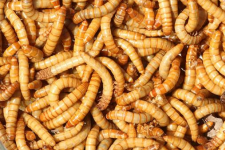Pet owners’ perception of insects as a protein source for cats and dogs

Introduction
Recent research has shown that insects may be an alternative source of protein for animal nutrition.1-5 Insects could also represent a “novel” protein source for managing adverse food reactions in pets.6 However, in most western countries, consumers are still reluctant about the idea of eating insects or feeding them to their pets.
Materials and methods
13 cat owners and 12 dog owners were asked to feed exclusively their pets with a new dry diet in a 28-day blind test (no information about the brand and the composition of the 2 test diets, Table 1 & 2). These diets were characterized by mealworm (Tenebrio molitor larvae) as the protein source. Owners assessed the new diets through online multiple-choice questionnaires on D7, D14 and D28, covering palatability, digestive tolerance, unexpected events, and general satisfaction. On D28, they also participated in individual face to face interviews: the concept of elimination diet to manage adverse food reactions was explained, and the composition of the test diet was finally revealed. Owners were free to react and comment.


 Results
Results
During the 28-day trial, the palatability and digestive safety were good, no unexpected events were observed, and the general satisfaction was good to excellent, with a mean satisfaction score of 7.6±1.9 (on a scale from 0 to 10). During the face to face interviews, the majority (92%) of owners had positive spontaneous reactions. They cited as key benefits of such diets an alternative source of protein to lower meat consumption, and a better environmental footprint. This approach seemed especially relevant to therapeutic purpose to manage food allergy. Some questions arose and mitigated owners’ enthusiasm, such as the species of insects or their geographic origin. 2 out of the 25 (8%) participants expressed high reluctance to giving insectbased diets to their pets, the main issues being their own phobia and the safety of such diets, despite the good results of the previous trial. Nevertheless, they admitted they could change their mind if their vets prescribed the diet.
Conclusion
These preliminary results showed that insect-based diets were well tolerated by pets and appreciated by the majority of owners. These diets appeared more appealing if prescribed by a veterinarian, with demonstrated effect on improvement of pet’s health. As it was also observed in a survey among veterinarians6 , detailed safety and nutritional information is required to improve owners’ perception and get their confidence in such diets.
References: 1Rumpold BA & Schlüter OK. Inn Food Sci Emerg Technol 2013; 17: 1-11. 2Makkar HPS et al. Anim Feed Sci Technol 2014; 197: 1-33. 3Hubert A. AllAboutFeed 2016; 24: 34-36. 4Bosch G et al. J Nutr Sci 2014; 3, e-29: 1-4. 5Bosch G et al. Anim Feed Sci Technol 2016; 221: 174-184. 6Pagani E et al. Proceed ESVCN Congress, Berlin, Germany, 15-17 Sept 2016.

